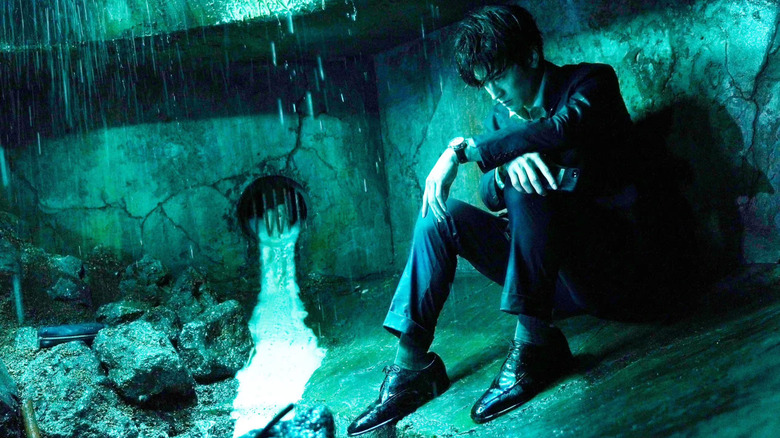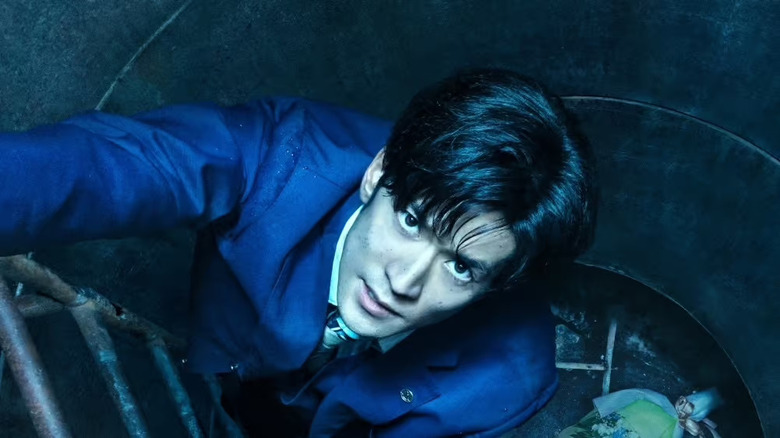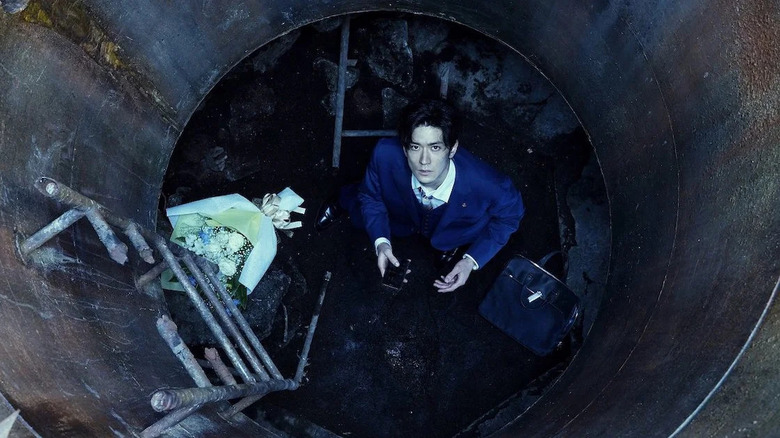#Manhole Review: A Single-Location Thriller That Doesn't Stink [Fantasia Fest 2023]
I've written about situational thrillers under Olympic-sized pool covers, atop mile-high radio tower platforms, and even locked in a rogue sailboat's bathroom — yet "#Manhole" still earns originality points. Director Kazuyoshi Kumakiri and writer Kazuyoshi Kumakiri pop the metal cover off an abandoned concrete basin like a bottle for catching fireflies. The single-location motivations behind "#Manhole" recall Mariano Cohn's SUV chamber piece "4x4," more obscure in presentation and nefariously themed. Where something like Rodrigo Cortés' "Buried" relies on the grounded claustrophobic trauma of being sealed alive in a coffin, "#Manhole" embraces absurdity and twisty storytelling beyond being stuck in one place. Cutthroat realism is traded for social media skewering amidst many other wicked veers into derangement, with a spike-tipped ending for the ages.
Yûto Nakajima stars as thriving Japanese businessman Shunsuke Kawamura. His coworkers throw him a congratulatory post-work party to celebrate his not-far-off wedding. Shunsuke walks home that night with a light-headed buzz, which worsens with each step he takes — the last of which goes right into an open manhole. He regains consciousness after falling down the tube into a mucky enclosure with no exit except for the uncovered street entrance, which a broken ladder makes nearly impossible to reach. What's Shunsuke to do? Create a social media profile and hope viral fame saves his life.
#Manhole cleverly satirizes social media
Single-location thrillers are a tough subgenre to handle. Stars must perfectly align to keep a character stuck in one place without boredom overtaking, but events must also be plausible enough to believe. "#Manhole" impressively balances excitement-stoking tactics using social media satirization and vengeful reveals to explain Shunsuke's suspicious actions (and obliviousness). Why no police involvement? Why doesn't his only successful phone-a-friend, Mai Kudô (Nao), sound worried and frantic? Kumakiri uses mysterious foreshadowing more than physical danger as Shunsuke relies on his "Manhole Girl" account followers — knowing a woman in peril will be found much faster than "Manhole Guy."
Pecker becomes an integral aspect of "#Manhole" — the film's knockoff bird app — as on-screen tweets ... I mean, "post" bubbles expose the white knights and trolls alike who populate social media timelines. As desperation sinks in and Shunsuke pleads for users to solve his broken GPS conundrum, we're treated to self-obsessed livestreamers who hunt "Manhole Girl" for fame, or justice seekers easily manipulated by "Manhole Girl's" siren cries for heroism. Shunsuke so effortlessly amasses an army through blatant lies, which Kumakiri's screenplay cleverly wields like a double-edged sword. Who says Shunsuke isn't falling victim to the same manipulation by another user who sees through his ruse?
Patience is rewarded by twists and turns
There's so little I want to talk about in this review because "#Manhole" is a concise premise that relies on blindly following everywhere you're not prepared for Shunsuke's predicament to go. Shunsuke attempts scaling the snapped-apart, barely stabilized steel ladder rungs only once before painfully learning his lesson — there's future violence and bodily punishment, but not until the finale. Spiders, reptiles, and other creepy-crawlies scamper around Shunsuke while a foamy substance starts filling the chamber to add a ticking clock aspect — bonus points for grossness when the laundry-machine-lookin' bubbles are explained — but they're never an immediate threat. Kumakiri does well to accentuate the maniacal swerves in Kumakiri's screenplay as Shunsuke begins to suspect he's been abducted, which adds a whodunit layer atop psychological isolation. It all blends together nicely, even if the tricky journey's destination is far more intriguing than early scenes attempting to hide what malevolence lurks behind shadowy later-act surprises.
"#Manhole" is an accomplished single-location horror tale that justifies its means through an evolution into preposterous madness. There's a zippiness to Kumakiri's direction that doesn't feel detrimentally claustrophobic, allowing outsiders to influence drama and tension via internet interactions or phone calls. Takuma Watanabe's original score is high energy, teamed with slick cinematography that adds an anime flavor once or twice. Nakajima commands the screen as his character highlights the vapidness of online culture and the ease of misrepresentation, selling inherent fear when looking upward at an escape hatch with no access. The film's back half is superior to more humble beginnings (in comparison), but especially once Shunsuke reveals his hand, "#Manhole" earns its praise as an ambitious, alluring, and commendably bats**t tale of hashtag-worthy survival.
/Film Rating: 7.5 out of 10


